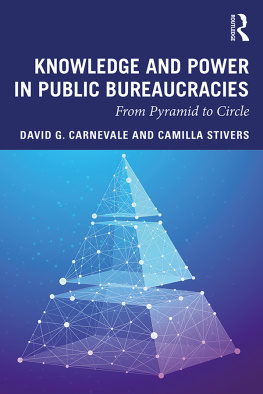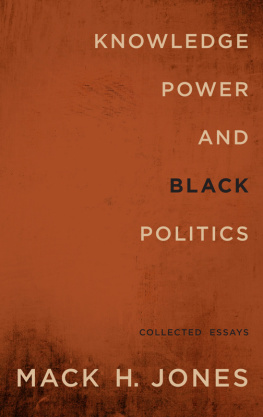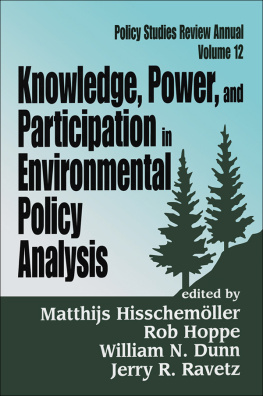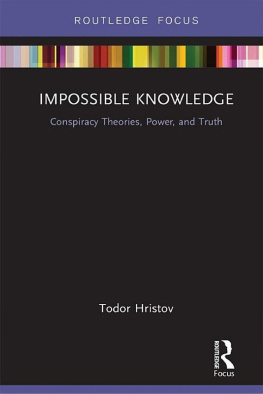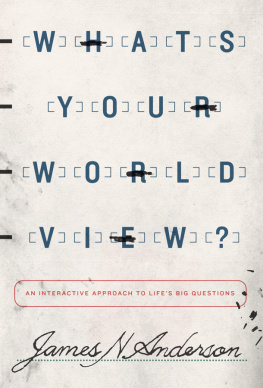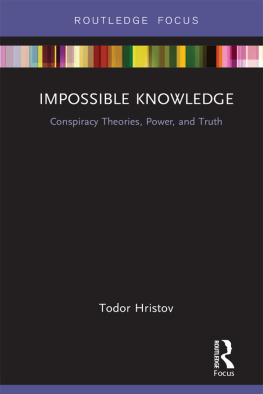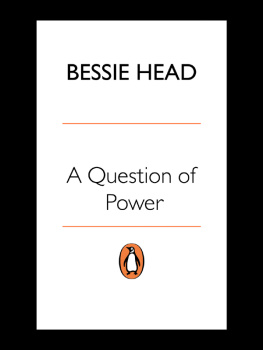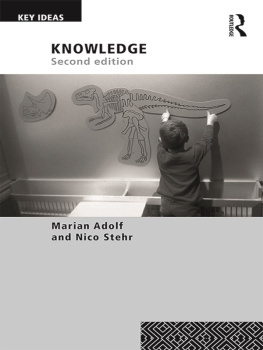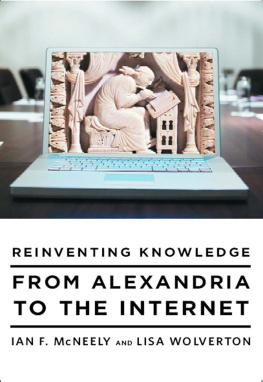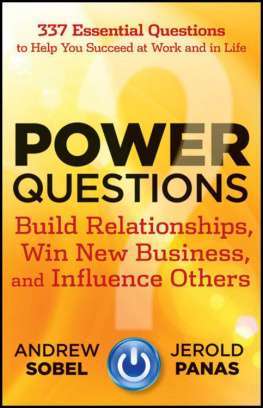A Question of Knowledge
A Question of
Knowledge
Richenda Power
First published 2000 by Pearson Education Limited
Published 2013 by Routledge
2 Park Square, Milton Park, Abingdon, Oxon OX14 4RN
711 Third Avenue, New York, NY 10017, USA
Routledge is an imprint of the Taylor & Francis Group, an informa business
Copyright 2000, Taylor & Francis.
The right of Richenda Power to be identified as the author of this Work has been asserted by her in accordance with the Copyright, Designs and Patents Act 1988.
All rights reserved. No part of this book may be reprinted or reproduced or utilised in any form or by any electronic, mechanical, or other means, now known or hereafter invented, including photocopying and recording, or in any information storage or retrieval system, without permission in writing from the publishers.
Notices
Knowledge and best practice in this field are constantly changing. As new research and experience broaden our understanding, changes in research methods, professional practices, or medical treatment may become necessary.
Practitioners and researchers must always rely on their own experience and knowledge in evaluating and using any information, methods, compounds, or experiments described herein. In using such information or methods they should be mindful of their own safety and the safety of others, including parties for whom they have a professional responsibility.
To the fullest extent of the law, neither the Publisher nor the authors, contributors, or editors, assume any liability for any injury and/or damage to persons or property as a matter of products liability, negligence or otherwise, or from any use or operation of any methods, products, instructions, or ideas contained in the material herein.
ISBN 13: 978-0-582-31102-2 (pbk)
British Library Cataloguing-in-Publication Data
A catalogue record for this book is available from the British Library
Library of Congress Cataloging-in-Publication Data
A catalog record for this book is available from the Library of Congress, USA
Power, Richenda, 1950
A question of knowledge / Richenda Power.
p. cm.
Includes bibliographical references (p. ) and index.
1. Knowledge, Sociology of. I. Title.
BD175.P6752000
306.42dc21
99056744
Set in 10/12pt Sabon by 35
Dedication
To Leslie Stevenson, dear cousin and philosopher, St Andrews.
Leslie commented on an early draft proposal:
One major question youll need to ask yourself is the relevance of empirical research to epistemological and methodological issues. What do you say to the objection that the latter issues are simply not empirical, but philosophical (a priori)? (Stevenson, personal communication, 28/6/96)
But Mannheim has been here before:
With the peace of mind that comes from the a priori premise that epistemology is independent of the empirical social sciences, the mind is once and for all closed to the insight which a broadened empiricism might bring. (Mannheim 1936:258)
It is my hope that the readers of A Question of Knowledge will find sufficient engagement with such questions, and the assumed givens that construct them, to continue such conversations, and to be unafraid to work empirically in the philosophers ground!
Contents
For a book raising questions about knowing and knowledge I am doubtless indebted to all the teachers (formal and informal) I have ever had, many met only through their books. Immediate thanks are due to: Prof. Barbara Harrison, who directed my doctoral studies; Paul Hebden who guided me into the sociology of science literature; Prof. Robert Farr for his lecture series Sociological forms of social psychology and postgraduate/staff research seminars at the London School of Economics 198587; Prof. Margaret Stacey who was my external examiner for both my postgraduate degrees and has never ceased to encourage my writing and research; Prof. Judy Allsop especially for mentoring my project on writing (199495). Thanks to important past influences: Andrew Rawlinson who introduced me to comparative religion; Mrs Gunchild Haydu with whom I corresponded as a student teacher through much of the 1970s.
Writing, whilst mainly done alone, relies on a clutch of interested, argumentative and critical others, with whom ideas can be tested, disposed of or developed. (Some were also kind enough to read.) Thank you Priscilla Alderson, Helen Busby, Richard Kilminster, Alice Lovell, Ruth McCurry, Heidi Mirza, Nina Nissen, Naomi Pfeffer, Carolyn Roth, Ursula Sharma, Gwynnedd Somerville.
Thank you: for sensitivity to my need for quiet solitude, Alethea Watterson, my mother, and my aunt Sheila Stevenson (who, sadly, died suddenly as I completed); for interest and reading, Acorn, and illustrations and mutual support, Goldy (my daughters); for a chapter title, and support whilst I studied, Margery Broad; for philosophical discussions, Leslie and Zinaida Stevenson; for the pool that rescued my computer shoulders, Dinah and Graham Kennedy.
For time out from working duties, thanks to Charles Hunt at the British School of Osteopathy and Kathy Pain and Bernard Sleigh of the Open University. For reading and asking questions thanks to Mark Corson, Alex Lowe, Sophie Raitz, Vangelis Scotionotis.
Thanks also to Eleanor Alberga, composer and pianist, for permission to quote her being interviewed about her composition The Wild Blue Yonder, and to Joan Tucker, friend, writer and encourager, for permission to quote from her novel Moving On (1996).
Publishers
Acknowledgements
We are grateful to the following for permission to reproduce illustrated copyright material:
Goldberry Broad, artist, for the cover illustration, , The conventional hierarchy of knowledge in Collins, H. (1990) Artificial Experts. Social Knowledge and Intelligent Machines (Cambridge, Massachusetts: MIT Press), p. 109.
Whilst every effort has been made to trace the owners of copyright material, in a few cases this has proved impossible and we take this opportunity to offer our apologies to any copyright holders whose rights we may have unwittingly infringed.
Advaita (referred to by Varela, Thompson and Rosch (1991)) one of the main types of the Vedanta, the systematisation of ancient teachings of Indian Philosophy (e.g. see Hirayana, M. (1973) Essentials of Indian Philosophy (Bombay: George Allen & Unwin))
a priori Latin; used in philosophical and mathematical contexts to refer to those matters which are assumed as given
ars inveniendi the art of finding out, discovering, inventing
existentially bounded this is the expression used in translation of Mannheim and Eliass notion of knowledge as connected with existence: Seinsverbundenheit
hypostatisation from Greek hypostasis, variously used as sediment, subject matter, essence. In the sociological context to hypostatise is to claim some feature is an underlying bedrock, in a similar sense as to essentialise
impartially used in the sense of an approach to the social study of knowledge, as laid out by Bloor (1976) for the Strong Programme, such that forms of knowledge are handled evenly by the researcher whether popularly, or expertly, considered better or lesser forms of knowledge





